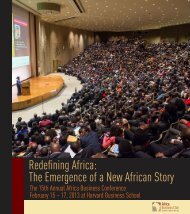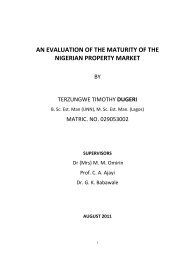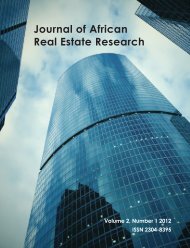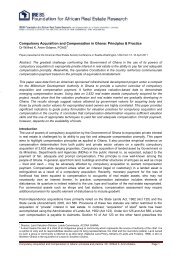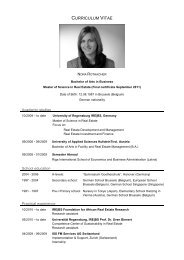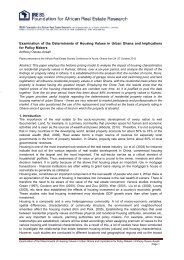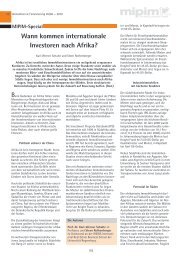Create successful ePaper yourself
Turn your PDF publications into a flip-book with our unique Google optimized e-Paper software.
74be remitted in foreign currency upon disinvestment. A nonresidentmay remit capital in foreign currency at any time.TaxationBusiness profits and rental income are taxed at a maximumrate of 35%;Profits from agricultural businesses are exempt from tax;Public and private companies, including banks, investmentof funds companies, insurance companies, companies andindividuals distributing oil and gas products directly toconsumers are taxed at a rate of 15%;Industrial companies and businesses are taxed at a rate of10%;Tobacco and Cigarettes manufacturing companies aretaxed at a rate of 30%;Withholding taxes are levied at a rate of 5%;Residents of Sudan or individuals who reside in Sudan forover six months are taxed on their worldwide income at amaximum rate of 15%;Sudan has signed double taxation agreements with theUnited Kingdom, Egypt, the United Arab Emirates, Chinaand Malaysia;Value Added Tax (VAT) is 15%.ImportsThe Government of Sudan has implemented importliberalization policies but licenses are required for all imports.These are obtained from the Ministry of Foreign Trade. Allimports must be by letters of credit from a local bank.Items such as food, beverages, live animals and animal productsare classified as restricted and require approval from therelevant government department. Goods such as opium,narcotic drugs, alcohol, indecent or obscene materials, false andcounterfeit coins and money may not be imported.Percentage of National Income: 14 %Commodities: Food, manufactured goods, refinery andtransportation equipment, medicines, chemicals, spices,textiles, wheat, fertilizers, rubber, paper.ExportsLicenses must be obtained for exports from the ministry ofForeign Trade and exports must be through a local bank. Exportsof certain items such as gum Arabic and livestock may only bemade by local companies.Percentage of the National Income: 17 %;Commodities: Gold, copper, chromium, oil and petroleumproducts, cotton, sesame, groundnuts, gum Arabic, sugar,hibiscus, seeds ( sunflower, watermelon seeds, senna),maize, fruits, vegetable, livestock, leather, and medical gas.Monetary PolicyThere is an Islamic banking system in Sudan. However theCentral Bank of Sudan implements a single monetary policy toensure price stability and maintain a stable exchange rate. Themonetary policy relies primarily on market-based instrumentsinstead of administrative allocation of credit.Legal SystemPrimary sources of law at all levels ofgovernment are Acts passed by the NationalLegislature and State Legislature, within thescope of the powers assigned to each levelas prescribed under the constitution.Another important source of law is statutory or subordinatelegislation under the authority of an Act of Parliament. The legalsystem rests on the constitution. The ultimate aim of the FederalNational Government is the protection of the rights andfreedoms of individuals as stipulated in the Bill of Rights. Theconstitution provides that religions, customs and beliefs aresources of moral strength and inspiration for Sudanese people.All laws must comply with the constitution. The constitutionprovides that nationally enacted legislation shall have as itssource of legislation Islamic Shar'ia.Nationally enacted legislation applicable to southern statesand/or the southern region has as its source of legislationpopular consensus, and the values and customs of the people.Case law provides an important source of law at all levels ofgovernment. Commercial law practice is influenced by theEnglish common law system.The Judicial institutions in the country are the ConstitutionalCourt and the Judiciary. The Constitutional Court is a SupremeCourt independent from the Judiciary with a jurisdiction overthe constitutional matters and inter-state conflicts. The Judiciaryis an independent <strong>org</strong>an which regulates and administers theCourts of Justice.Intellectual PropertySudan is party to most of the significant international treatiesrelating to intellectual property.Financial Services/InsuranceFinancial Services and insurance businesses are regulated by theBank of Sudan, Khartoum Stock Exchange and the InsuranceSupervisory Authority.Membership of International and Regional OrganisationsSudan joined the Arab League on 19 January 1956.Sudan is a member of the Intergovernmental Authority onDevelopment (IGAD) comprising Djibouti, Eritrea, Ethiopia,Kenya, Somalia, Sudan and Uganda.Sudan is also a member of the Common Market for Eastern andSouthern <strong>Africa</strong> (COMESA) and the Community of Sahel-SaharanStates (CEN-SAD)and numerous other international and regional<strong>org</strong>anisations.Road and TransportPipelines:Crude oil pipelines:3 830 km;Refined products pipeline: 1 556 km.Railways: 4 239 km.Federal Roads:Paved: 11 000 km;Under construction: 34 021 km.Airports with Paved Runways: 15.Heliports: 87.Length of Waterways: 2567 km.Sea Ports: 7 ports namely: Port Sudan, Sawakin (Uthman DignaPort), Bashayer, Southern Port , Osaif Port, Green Port and Al-



